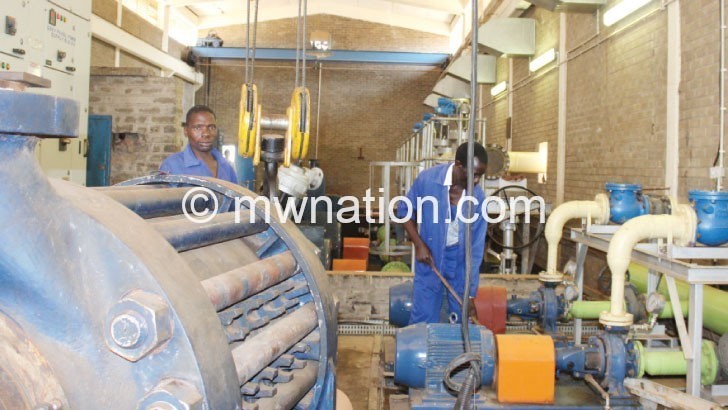State firms limping
An analysis of the report by Auditor General (AG), on selected accounts of statutory bodies to period ending June 2018, shows that water boards are limping, facing weaknesses in financial control and operations, which are affecting provision of water.
The weaknesses include sustainability of electricity costs, failure to repay loans on time, but also non-compliance in remitting pension funds, Pay As You Earn (Paye), Value-Added Tax (VAT), and heavy borrowing to finance operations.

Apart from Blantyre Water Board (BWB), Lilongwe Water Board (BWB), Southern Region Water Board (SRWB) and Northern Region Water Board (NRWB), the report also examines Malawi Housing Corporation (MHC), Electricity Generation Company (Egenco), National Oil Company of Malawi (Nocma) and Admarc.
The analysis shows that BWB is at high-risk, largely due to non-revenue water and high electricity bills that make almost 40 percent of its monthly operating expenses.
The report reads: “A total loss of K2.4 billion was registered during the year ended 30 June 2018 as opposed to a loss of K5.5 billion recorded in the financial year ending 30 June 2017.
“BWB has not valued its reticulations since 30 June 2011. This non-valuation combined with old infrastructure has constantly affected BWB efficiency resulting in performance below capacity.
“The cost of sales and payables’ balances that the board’s electricity expends accounts for over 80 percent of the cost of sales. The board has challenges in settling the same when it falls due. As at June 30 2018, the board had electricity arrears of K4 billion (2017: K3 billion).”
By June 30 2018, the report shows that BWB had failed to pay government loans, sitting at K1.5 billion in arrears, pension contributions totaling K775 million, Paye balance of K1.4 billion and VAT arrears of K1.15 billion.
Acting Auditor General Thomas Makiwa has since recommended that a forensic audit of the high risk areas be conducted as soon as possible and that roles of top management and their performance should be assessed to ascertain their contribution to the going concern problems of BWB.
SRWB which is ranked as being at medium risk, has challenges that range from failure to remit pension funds and VAT on time, stuck metres, which leads to the board billing customers an average amount based on consumption for the previous three months.
The Board’s Quick Water System has also been labeled as inefficient and ineffective, as it cannot produce a full report of debtors aged list analysis, leading to delays in updating receipts of customers and failure to produce receipts to acknowledge receipt from customers.
“Operating profit for the year was down by 4 percent on a year to year basis, to over K2.5 billion from K2.6 billion, in 2017. The under-performance was on account of revenue growing dismally by 1.7 percent, largely due to drying up and dwindling of water sources in our supply areas.”
The other two, NRWB and LWB have been marked low risk, with the former’s operations said to be favourable largely due to the huge amount of loans that government continues to guarantee on its behalf.
“The board’s current liabilities as at June 30 2018 exceeded current assets by over K589 million. The board is experiencing negative working capital pressures and relies on borrowings to finance its operations.
“While the board is generating revenue on a monthly basis at an average of over K600 million, recoveries from customers are only K350 million per month subjecting the board to serious working capital challenges.”
LWB is said to have recorded good financial performance with a profit after tax of K2.5 billion registered at the end of the financial year. The total recurrent expenditure for the year was K13.9 billion against a corresponding budget allocation of K16.1 billion.
Other parastatals affected too
Besides the water boards, the report has also exposed the risk at MCH, saying, while it recorded an increase in trading revenue, the parastatal incurred a lot more trading expenses in 2018 and 2017 amounting to K4.7 billion and K3.7 billion, respectively.
“This has resulted in an operating loss of K1.1 billion for 2018 and K1.1 billion for 2017. This should be a cause for going concern,” the audit report notes.
MHC reported a surplus as result of revaluation on investment properties, despite registering an operating loss.
At Nocma, the report shows that the institution posted a loss of K1.2 billion registered during the year ended June 30 2018 as opposed to loss of K 0.38 Billion recorded in the financial year 2016-2017.
Among others, there is concern that the institution has no reconciliations prepared and reviewed on a monthly basis and at year end except for bank reconciliations.
At Egenco, besides delays in submitting VAT returns, the company has also been faulted for lacking consistency on how revenue from electricity generation is accounted for due to the absence of the Power Purchase Agreement with Escom.
Comptroller of Statutory Corporations, Stuart Ligomeka has said they have assisted in lobbying to ensure that the water boards are allowed to install pre-paid water meters in the public institutions, including at Capital Hill.
He said: “We have also supported the boards of directors in coming up with Performance Management Systems which they can use in ensuring that the respective challenges are translated into targets for respective members of Executive Managements of the institutions. The expectation is that once the tools are implemented, rewards and sanctions will motivate employees to perform at their level best.”
Meanwhile, the audit report has, among other things, recommended that strict compliance with financial provisions should be enforced in the statutory entities in order to improve public financial management and control.
It also suggests that the Board of Directors, especially the chairpersons, should be held accountable if their institutions have dismally performed, stressing that the chairperson should be signing an enforceable performance contract with the appointing authority.





